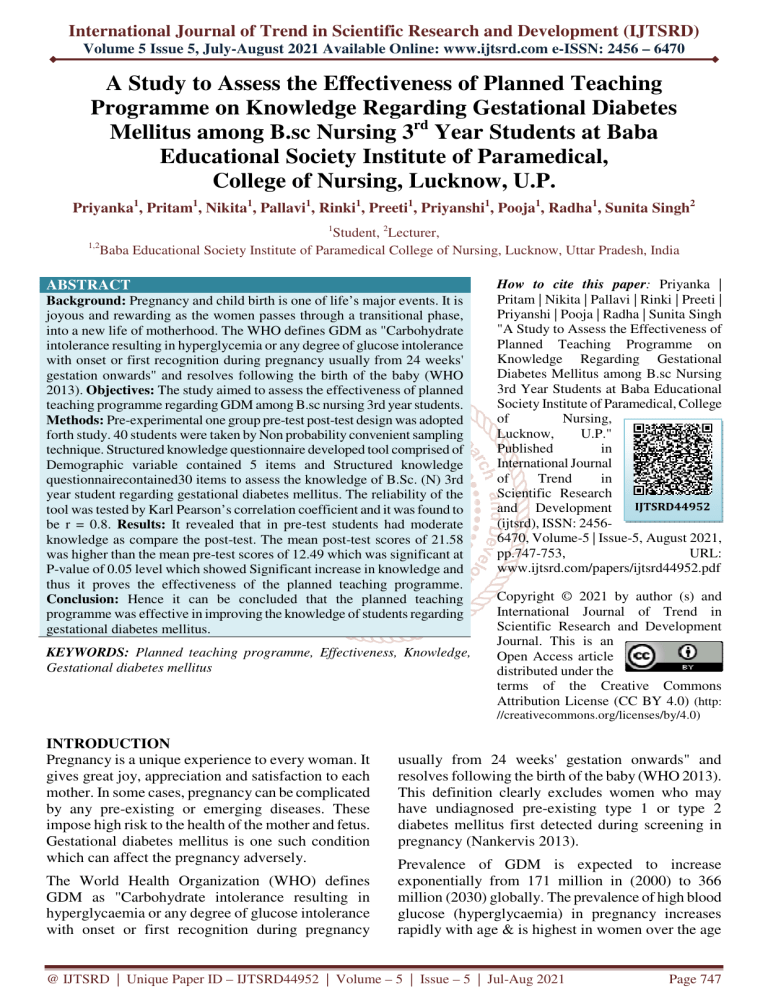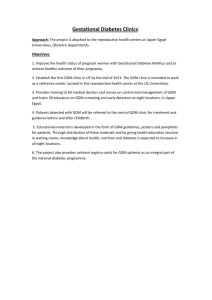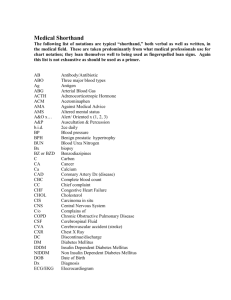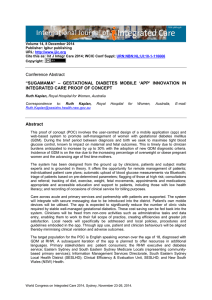
International Journal of Trend in Scientific Research and Development (IJTSRD)
Volume 5 Issue 5, July-August 2021 Available Online: www.ijtsrd.com e-ISSN: 2456 – 6470
A Study to Assess the Effectiveness of Planned Teaching
Programme on Knowledge Regarding Gestational Diabetes
Mellitus among B.sc Nursing 3rd Year Students at Baba
Educational Society Institute of Paramedical,
College of Nursing, Lucknow, U.P.
Priyanka1, Pritam1, Nikita1, Pallavi1, Rinki1, Preeti1, Priyanshi1, Pooja1, Radha1, Sunita Singh2
1
Student, 2Lecturer,
1,2
Baba Educational Society Institute of Paramedical College of Nursing, Lucknow, Uttar Pradesh, India
ABSTRACT
Background: Pregnancy and child birth is one of life’s major events. It is
joyous and rewarding as the women passes through a transitional phase,
into a new life of motherhood. The WHO defines GDM as "Carbohydrate
intolerance resulting in hyperglycemia or any degree of glucose intolerance
with onset or first recognition during pregnancy usually from 24 weeks'
gestation onwards" and resolves following the birth of the baby (WHO
2013). Objectives: The study aimed to assess the effectiveness of planned
teaching programme regarding GDM among B.sc nursing 3rd year students.
Methods: Pre-experimental one group pre-test post-test design was adopted
forth study. 40 students were taken by Non probability convenient sampling
technique. Structured knowledge questionnaire developed tool comprised of
Demographic variable contained 5 items and Structured knowledge
questionnairecontained30 items to assess the knowledge of B.Sc. (N) 3rd
year student regarding gestational diabetes mellitus. The reliability of the
tool was tested by Karl Pearson’s correlation coefficient and it was found to
be r = 0.8. Results: It revealed that in pre-test students had moderate
knowledge as compare the post-test. The mean post-test scores of 21.58
was higher than the mean pre-test scores of 12.49 which was significant at
P-value of 0.05 level which showed Significant increase in knowledge and
thus it proves the effectiveness of the planned teaching programme.
Conclusion: Hence it can be concluded that the planned teaching
programme was effective in improving the knowledge of students regarding
gestational diabetes mellitus.
KEYWORDS: Planned teaching programme, Effectiveness, Knowledge,
Gestational diabetes mellitus
How to cite this paper: Priyanka |
Pritam | Nikita | Pallavi | Rinki | Preeti |
Priyanshi | Pooja | Radha | Sunita Singh
"A Study to Assess the Effectiveness of
Planned Teaching Programme on
Knowledge Regarding Gestational
Diabetes Mellitus among B.sc Nursing
3rd Year Students at Baba Educational
Society Institute of Paramedical, College
of
Nursing,
Lucknow,
U.P."
Published
in
International Journal
of
Trend
in
Scientific Research
IJTSRD44952
and Development
(ijtsrd), ISSN: 24566470, Volume-5 | Issue-5, August 2021,
pp.747-753,
URL:
www.ijtsrd.com/papers/ijtsrd44952.pdf
Copyright © 2021 by author (s) and
International Journal of Trend in
Scientific Research and Development
Journal. This is an
Open Access article
distributed under the
terms of the Creative Commons
Attribution License (CC BY 4.0) (http:
//creativecommons.org/licenses/by/4.0)
INTRODUCTION
Pregnancy is a unique experience to every woman. It
gives great joy, appreciation and satisfaction to each
mother. In some cases, pregnancy can be complicated
by any pre-existing or emerging diseases. These
impose high risk to the health of the mother and fetus.
Gestational diabetes mellitus is one such condition
which can affect the pregnancy adversely.
The World Health Organization (WHO) defines
GDM as "Carbohydrate intolerance resulting in
hyperglycaemia or any degree of glucose intolerance
with onset or first recognition during pregnancy
usually from 24 weeks' gestation onwards" and
resolves following the birth of the baby (WHO 2013).
This definition clearly excludes women who may
have undiagnosed pre-existing type 1 or type 2
diabetes mellitus first detected during screening in
pregnancy (Nankervis 2013).
Prevalence of GDM is expected to increase
exponentially from 171 million in (2000) to 366
million (2030) globally. The prevalence of high blood
glucose (hyperglycaemia) in pregnancy increases
rapidly with age & is highest in women over the age
@ IJTSRD | Unique Paper ID – IJTSRD44952 | Volume – 5 | Issue – 5 | Jul-Aug 2021
Page 747
International Journal of Trend in Scientific Research and Development @ www.ijtsrd.com eISSN: 2456-6470
of 45. In 2019 were an estimated 223 million women
(20-79 yrs) living with diabetes. This no. is increase
to 343 million by 2045. 20 million or 16% of live
births had some form of hyperglycaemia in
pregnancy. An estimated 84% were due to gestational
diabetes. The vast majority of cases of
hyperglycaemia in pregnancy were in low & middle
income countries, where access to maternal care is
often limited.
Several maternal and neonatal complications may be
caused by Diabetes in pregnancy. Maternal
complications include fasting hyperglycemia,
pregnancy-induced hypertension, infections whereas
abortion, preterm labor, hydramnios and unexplained
fetal deaths are pregnancy complications.
Macrosomia, fetal malnutrition, neural tube defects
and cardiac anomalies are some of the fetal
complications & secondary complications like
shoulder dystocia, cesarean delivery & birth trauma.
The World Health Organization (WHO) 1999 criteria
defined GDM by fasting plasma glucose (FPG) level
R7.0 mmol/l (126 mg/dl) or 2-h plasma glucose (PG)
levels after a 75 g oral glucose tolerance test (OGTT)
R7.8 mmol/l (140 mg/dl). The Indian criteria for
GDM use only the 2-h criteria (DIPSI). The
prevalence of GDM. when using the WHO 1999
criteria range between 1 and 14% in different
populations.
GDM Pregnant women should be managed by
Medical Nutrition Therapy (MNT), and Insulin
therapy/ Metformin as required. In the postpartum
period, OGTT should be repeated at 6 weeks after
delivery, if blood sugar <140 mg/dl, then women
should be referred to NCD clinic for Post Prandial
Blood Sugar (PPBS) testing annually.
Insulin is historically the first-line treatment because
of its safety and effectiveness. Oral hypoglycemic
agents, especially metformin, are reliable in the
management of blood glucose and are a safe and
cheaper alternative. Furthermore, metformin is
associated with lower gestational weight gain
(GWG), had a reduced risk of hypoglycaemia and
showed no compromise of the motor, linguistic and
social development in recent studies. Despite all these
benefits, in up to 46% of women, adequate glycaemic
control is not achieved with metformin alone,
requiring insulin supplementation.
NEED OF THE STUDY:
WHO estimated that every year a huge population
51,500 of the women die due to their maternal health
cause or maternal illness. The highest rate of maternal
death is in India(1,36,000 per year). The Indian
women had a greater risk of dying that because of
maternal health in pregnancy & child birth as
compared to women in developing countries.
The rationale for antenatal care is essential to screen a
health problems of the women to detect early sign of
diseases & their complications in women to provide
effective knowledge & awareness associated with
pregnancy to reduce the child mortality rate & to
improve maternal health.
Sharma Priya, Malik Sujeeta, Mathew Jubin, S.
Muralee Dharan (2020), Conducted an evaluative
research study on effectiveness of STP on knowledge
regarding management of DM among patients with
type -2 DM in a selected CHC of Dadra & Nagar
Haveli Area. A pre-experimental (one group pre-testpost-test) design was used. Total 80 samples were
taken. Result showed that post-test score was higher
than pre-test score. This study concluded that the STP
was effective.
PROBLEM STATEMENT:
A study to assess the effectiveness of Planned
Teaching Programme on knowledge regarding
Gestational Diabetes Mellitus among B.sc nursing 3rd
year students at Baba Educational Society Institute of
Paramedical, College of Nursing, Lucknow, U.P.
OBJECTIVES:
To assess the pre-test & postest knowledge
regarding gestational diabetes mellitus among
B.sc nursing 3rd year students.
To assess the effectiveness of planned teaching
programme regarding GDM among B.sc nursing
3rd year students.
To find out the association between the pre-test
knowledge level of B.sc nursing 3rd year students
with their selected demographic variables.
HYPOTHESIS:
H0- There is no significant difference between
pre-test & post-test scores of knowledge among
B.sc nursing 3rd year students.
H1-There is significant difference between pretest & post-test scores of knowledge among B.sc
nursing 3rd year students.
H2-There will be significant association between
pre-test knowledge of the B.sc nursing 3rd year
students regarding GDM & selected demographic
variables.
OPERATIONAL DEFINITIONS:
Effectiveness: Effectiveness means producing and
intended result. In this study, it refers to determine the
extent to which the planned teaching programme has
achieved the Desire effect in improving knowledge
regarding gestational Diabetes mellitus among B.sc
nursing 3rd year students.
@ IJTSRD | Unique Paper ID – IJTSRD44952 | Volume – 5 | Issue – 5 | Jul-Aug 2021
Page 748
International Journal of Trend in Scientific Research and Development @ www.ijtsrd.com eISSN: 2456-6470
Planned teaching programme: PTP is a
systematically instructions developed to help the
people to learn. In this study it refers to a planned
health education regarding knowledge on definition,
risk factors, symptoms and management of
Gestational diabetes mellitus by using Audio visual
aids to create an improvement knowledge regarding
B.sc nursing 3rd year student.
Knowledge: Knowledge refers to awareness for
understanding related to causes and symptoms and its
management among B.sc nursing 3rd year students.
Gestational diabetes mellitus: Gestational Diabetes
mellitus (GDM) defined as carbohydrate intolerance
with recognition or onset during pregnancy.
Students: Students are studying in Baba Educational
Society, Institute of Paramedical, college of Nursing,
Lucknow, U.P, in B.sc nursing 3rd year.
MATERIAL AND METHODS:
Research approach:
Quantitative research approach.
Research design:
Pre-experimental one group pre-test post-test research
design.
Variables:
Dependent variable- Knowledge
Gestational Diabetes Mellitus.
regarding
Independent variable- Planned teaching programme
on Gestational Diabetes Mellitus.
Demographic variable- Age, education, religion,
type of family, place of stay and dietary pattern of
students.
Research setting:
The study was conducted in Baba Educational
Society, Institute of Paramedical, College of Nursing,
Lucknow, Uttar Pradesh.
Population:
Target population: B.sc nursing 3rd year students.
Accessible population: B.sc nursing 3rd year
students of Baba College of Nursing.
Sample:
B.sc nursing 3rd year students at Baba Educational
Society, Institute of Paramedical, College of Nursing,
Lucknow, U.P.
Sample size: 40 students.
Criteria for sample selection:
Inclusion criteria:
B.sc nursing 3rd year students who are willing to
participate.
B.sc nursing 3rd year students who are available at
the time of data collection.
Exclusion criteria:
B.sc nursing 3rd year students who are not willing
to participate.
B.sc nursing 3rd year students who are not present
during the study.
Tool and method of data collection:
Section A. Demographic data
Section B. Structured knowledge Questionnaire
Selection and development of tool: Structured
knowledge questionnaire was used for the study.
Questionnaire is used to get exact & complete
information from the subject. It was felt that
questionnaire would encourage the subjects to give
frank information & help in collecting data from
literate subject. A questionnaire schedule was
prepared to assess the knowledge level of B.sc
nursing 3rd year students regarding Gestational
diabetes mellitus. The tool was developed after
extensive review of literature, internet search and
expert advice.
Description of the tool: The tool comprised of two
sections:
SECTION A: Demographic data- consisted of 5
items, which comprised of age, education, religion,
type of family place of stay and dietary pattern.
SECTION
B:
Structured
knowledge
Questionnaire- It consists of 30structured
questionnaires to assess the knowledge regarding
Gestational Diabetes Mellitus. The tool consists of
questions related to meaning, causes & risk factors,
signs & symptoms, diagnostic evaluation,
complications & Management of Gestational
Diabetes Mellitus. Demographic variables were coded
to assess the background of B.sc nursing 3rd year
students and there by subject it for statistical analysis.
It consists of 30 items all of which are scored. The
total score was 30 and each question contains of four
answers out of which one answer is correct. The
correct answer is given a score of ‘one’ and each
wrong response a score of ‘zero’.
Sample techniques:
Non probability convenient sampling technique.
@ IJTSRD | Unique Paper ID – IJTSRD44952 | Volume – 5 | Issue – 5 | Jul-Aug 2021
Page 749
International Journal of Trend in Scientific Research and Development @ www.ijtsrd.com eISSN: 2456-6470
KNOWLEDGE SCORING PROCEDURE: Level of knowledge
Score
Adequate knowledge (61-100%)
19 – 30
Moderately knowledge (31-60%)
10 – 18
Inadequate knowledge (Less than 30%) 0 – 9
Based on obtained score subjects are arbitrarily grouped in 3 groups are as given below:
Adequate = 19-30
Moderate = 10-18
Inadequate = 0-9
Reliability of tool: The reliability was computed by using Karl Pearson’s correlation coefficient formula.
Acceptable cut-off value of coefficients was between 0.8. This indicate that the tool which was used in the study
was reliable.
Data collection procedure-:
The researcher has obtained a formal permission from the principal of Baba Educational Society, Institute of
Paramedical, College of Nursing, Lucknow, U.P.
After getting the permission the nature and purpose of study was explained to the students. The researcher
initially obtained an oral consent from each student.
The researcher provided demographic & structured knowledge questionnaire tool to participants & provided
30-40 minutes to fill it.
Assessment of pre-test knowledge was done by using structured questionnaire after which PTP was
administered. Post-test was conducted using the same structured questionnaire on the fifth day of pre-test.
The time taken to complete one questionnaire was 30-40 minutes. The collected data were analyzed using
descriptive and inferential statistics.
Ethical consideration:
A formal written permission obtained from the principal of Baba Educational Society, Institute of
Paramedical, College of Nursing, Lucknow, U.P.
Informed consent was taken from all samples to be a part of the study. The subjects were informed that the
participation was voluntary. They were also informed that they can withdrawn from the study at any time.
Confidentiality and anonymity of information was maintained.
Plan for data analysis:
The plan for data analysis includesDemographic variables would be analyzed by using Frequency and percentage.
‘t-test’ will be used for the significance.
Chi squire test used for association between the pre-test knowledge of the B.sc nursing 3rd year students
regarding GDM & selected demographic variables.
RESULTS
Table-1: Distribution of subjects according to their demographic variables
n = 40
S.NO DEMOGRAPHIC VARIABLES FREQUENCY (f) PERCENTAGE (%)
1.
Age (in years)
a)
18 – 21
32
80
b)
22 – 25
8
20
c)
26 – 30
0
0
d)
30 & above
0
0
2.
Religion
a)
Hindu
40
100
b)
Muslim
0
0
c)
Sikh
0
0
d)
Christian
0
0
@ IJTSRD | Unique Paper ID – IJTSRD44952 | Volume – 5 | Issue – 5 | Jul-Aug 2021
Page 750
International Journal of Trend in Scientific Research and Development @ www.ijtsrd.com eISSN: 2456-6470
3.
4.
5.
Type of family
a)
Nuclear
b)
Joint
Place of stay
a)Home
b)Rent
c)Hostel
Dietary pattern
a)
Vegetarian
b)
Non – vegetarian
29
11
72.5
27.5
25
7
8
62.5
17.5
20
29
11
72.5
27.5
Table 1 described about the frequency, percentage distribution of demographic variable.
Distribution of the subject by age revealed that majority of the subject, i.e. 32 were between 18-21 (80%), 8
were between 22-25 (20%) years of the age group. Asper the findings of the study, the majority of subjects i.e.
40 were hindu. As per the findings of the study, the majority of belongs to nuclear family (72.5%) and only
27.5% belongs to joint family. As per the findings of the study, the majority of subject i.e. 25 belongs to home
(62.5%), 7 belongs to rent (17.5%) & 8 belongs to hostel (20%). As per the findings of the study, the majority 29
(72.5%) have vegetarian and 11 (27.5%) have non-vegetarian.
Table 2: Pre-test & post-test knowledge level of b.sc (n) 3rd year students
Knowledge level
Pre test (f) Pre test (%) Post test (f) Post test (%)
A. Inadequate knowledge
7
17.50
0
0
B. Moderate knowledge
33
82.50
12
30
C. Adequate knowledge
0
0
28
70
Total
40
100
40
100
Table 2 shows that 82.50% of participants had moderate knowledge and only 17.50% had inadequate knowledge
in pre-test and in post-test 70% had adequate knowledge and 30% had moderate knowledge respectively.
Table 3: Mean, Mean percentage and Standard deviation of pre-test knowledge regarding aspects of
GDM among B.sc (N) 3rd year students
n = 40
S.NO Aspects of knowledge No. of items Max. score Mean Mean (%) SD
1.
Meaning
5
5
2.78
55.60
0.35
2.
Causes & risk factors
6
6
1.67
27.83
0.68
3.
Sign & symptoms
5
5
2.02
40.40
0.47
4.
Investigations
3
3
1.1
36.67
0.3
5.
Complications
2
2
0.27
13.50
0.27
6.
Management
9
9
4.65
51.67
0.69
OVERALL
30
30
12.49
225.67
2.76
Table 3- The above table shows that the maximum mean percentage obtained by the subjects is found in the
aspect of meaning (55.60%) followed by management (51.67%), Sign & symptoms (40.40%), investigations
(36.67%), causes & risk factors (27.83%), and least mean score (13.50%) found in the aspect of complications.
The overall knowledge scores of respondents were found to be 225.67 with standard deviation 2.76 in pre-test.
Table 4: Mean, Mean percentage and Standard deviation of post-test knowledge regarding aspects of
GDM among B.sc (N) 3rd year students
S.NO Aspects of knowledge No. of items Max. score Mean Mean (%) SD
1.
Meaning
5
5
4.07
81.40
0.14
2.
Causes & risk Factors
6
6
4.27
71.16
0.27
3.
Sign & symptoms
5
5
3.37
67.40
0.26
4.
Investigations
3
3
1.85
61.67
0.18
5.
Complications
2
2
1.20
60
0.13
6.
Management
9
9
6.82
75.78
0.34
OVERALL
30
30
21.58
417.41
1.30
@ IJTSRD | Unique Paper ID – IJTSRD44952 | Volume – 5 | Issue – 5 | Jul-Aug 2021
Page 751
International Journal of Trend in Scientific Research and Development @ www.ijtsrd.com eISSN: 2456-6470
Table 4- The above table shows that the maximum mean percentage obtained by the subjects is found in the
meaning (81.40%) followed by management (75.78%) causes & risk factor (71.16%), sign & symptoms
(67.40%), investigations (61.67%), and least mean score (60%) found in the aspect of complications. The overall
knowledge scores of respondents were found to be 417.41 with standard deviation 1.30 in post -test.
Table-5: effectiveness of PTP on knowledge of GDM among b.sc (n) 3rd year students
Knowledge Mean Standard Deviation Mean difference Sd ‘t’-value Sifnificance
PRE-TEST
12.5
3.09
9.1
3.09
8.20
P<0.001
POST-TEST 21.6
6.18
Table 5- The above table revealed with the pre-test and post-test knowledge score which were obtained by the
use of structured questionnaire on of gestational diabetes mellitus. Pre-test mean value (12.5) and post-test mean
value (21.6) were obtained. ‘t’ test was 8.20, P<0.001. That shows effectiveness of PTP in term of knowledge
increased. Therefore, the null hypothesis is rejected and research hypothesis H1is accepted.
Table-6: Association of pre-test knowledge regarding GDM with selected demographic variables.
N=40
Pre-test
S.
Demographic
Chi-square
Level of
Df
No.
variables
value χ2
significance
Inadequate Moderate Adequate
Age (in years)
a) 18 – 21
5
27
0
2
6
0
6
0.389
NA
1. b) 22 – 25
c) 26 – 30
0
0
0
d) 30 & above
0
0
0
Religion
a) Hindu
7
33
0
0
0
0
6
0
NA
2. b) Muslim
c) Sikh
0
0
0
d) Christian
0
0
0
Type of family
6
23
0
3. a) Nuclear
2
0.743
NA
b) Joint
1
10
0
Place of stay
a) Home
5
20
0
4
2.399
NA
4.
b) Rent
2
5
0
c) Hostel
0
8
0
Dietary pattern
6
23
0
2
0.743
NA
5. a) Vegetarian
b) Non-vegetarian
1
10
0
The above table shows that the obtained χ2 value is less than the table value at 0.05 levels of significance.
Therefore, there is no significant association between pre-test knowledge scores with selected demographic
variables of participants. Therefore, the null hypothesis is accepted and research hypothesis H2 is rejected.
DISCUSSION:
Findings related to the effectiveness of structured
teaching programme
The obtained ‘t’ value 8.20 was greater than the table
value at 0.05. Hence the research hypothesis which
stated there will be significant difference in pre and
post level of knowledge on Gestational Diabetes
Mellitus among B.Sc. (N) 3rd year students was
accepted. This showed that the structured teaching
programme was effective in increasing the knowledge
of B.Sc. (N) 3rd year students regarding Gestational
Diabetes Mellitus.
These findings were accordance to the study
conducted by Wani. N, Bashir. M, Akhter.K,(2019),
Conducted a pre-experimental study to assess the
effectiveness of structured teaching programme on
knowledge regarding management of gestational
diabetes mellitus among pregnant women. A preexperimental one group pre-test post-test design with
non-probability purposive sampling technique used.
Total 60 samples were taken. The result finding
indicates the effectiveness of STP in increasing the
level of knowledge of pregnant women regarding
management of GDM at 0.05 level of significance.
@ IJTSRD | Unique Paper ID – IJTSRD44952 | Volume – 5 | Issue – 5 | Jul-Aug 2021
Page 752
International Journal of Trend in Scientific Research and Development @ www.ijtsrd.com eISSN: 2456-6470
Conclusion: GDM is the most common medical and
metabolic complication seen in pregnancy. Women
who are at high risk of developing GDM should be
appropriately screened to reduce maternal and fetal
morbidity. The method of screening and diagnosis of
GDM has been outlined.
[5]
K. Akhalya, S. Sreelatha, Rajeshwari, K.
Shruthi (2018), A review article-GDM,
endocrinology & metabolism international
journal, 2018: 7(1): 26-39
[6]
Ali A.D et al.(2016) Prevalence & risk factors
of GDM in yemen international journal of
women’s health, 2016(8);35-41
[7]
Arora G.P et al. (2021), Prevalence & risk
factors of Gestational Diabetes in Punjab, North
india: results from a population screening
program
[8]
A similar study can be conducted using pre-test
post-test with control group design.
Wang. C & Yang H.X, (2016), Diagnosis,
Prevention & management of GDM, chronic
disease & translation medicine: 2016;2(4): 199203
[9]
A comparative study can be done to evaluate the
effectiveness of the structured teaching
programme with other methods of teaching like a
self-instructional module or video-based method.
Gentle. I et al. (2018), Metformin in
Gestational diabetes mellitus: Predictors of
poor response, European society of
endocrinology, 2018;178(1);129-135
[10]
Hussain. T et al.(2021), Prevalence, risk factors
& morbidities of GDM among pregnant women
attending a hospital in an urban area of
Bhubaneshwar, Odisha, Journal of family
medicine & primary care; 2020(9);5327-5233
[11]
Sharma Priya, Malik Sujeeta, Mathew Jubin, S.
Muraleedharan (2020), Effectiveness of STP on
knowledge regarding management of Diabetes
mellitus among patients with T2DM in a
selected CHC of Dadra & Nagar Haveli,
International journal of creative research
thoughts (IJCRT), 2020;8(4);2320-2382
[12]
Wani. N, Bashir. M, Akhter.K,(2019), Astudy
to assess the effectiveness of STP on
knowledge regarding management of GDM
among pregnant women attending maternity
hospital
SKIMS,
Srinagar
Kashmir,
International journal of nursing and midwifery
research, 2019;6(1);17-22
Recommendations:
An experimental study can be undertaken with a
control group for effective comparison of the
result.
A study can be conducted by including additional
demographic variables.
The study can be replicated on a large sample to
validate the findings and make generalizations.
Conflict of interest: No
Financial support: Self
REFERENCE:
[1] Anand. M, Mahajan. D.S, (2017), To study the
incidence of GDM & risk factors associated
with GDM, International journal of advances in
medicine, 2017;4(1);112-116Available online
at:www.ijaresm.com.
[2]
R. Martis et al (2018), Treatment for women
with Gestational diabetes mellitus an overview
of Cochrane systematic review, Cochrane
database of systematic review, 2018;(8)
[3]
Available
online
at:
https://www.slideshare.net/SushantYadav33/ge
stational-diabetes-mellitus-by-sushant
[4]
Available
online
at:
https://www.slideshare.net/rishidev38/gestation
al-dibetes
@ IJTSRD | Unique Paper ID – IJTSRD44952 | Volume – 5 | Issue – 5 | Jul-Aug 2021
Page 753




